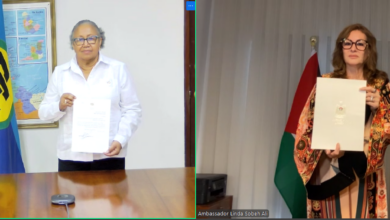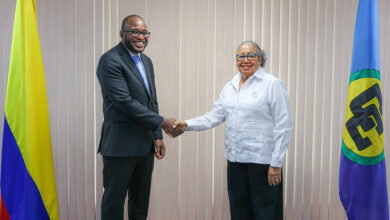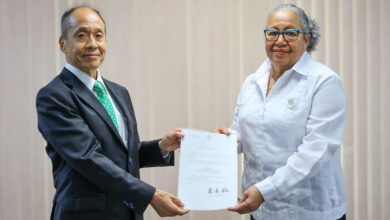Thank you Dr Carrington, our Secretary General of CARICOM
Your Excellency the Deputy Governor General of St Vincent and the Grenadines, Mr. Denniston Bobb and Mrs. Bobb
Colleague Heads of State and Government
Distinguished Ministers of the Government of St Vincent and the Grenadines
Other CARICOM Ministers
Leader of the Opposition, Hon Dr Ralph Gonsalves of St Vincent and the Grenadines and other distinguished Members of Parliament
Members of the Diplomatic Corps
Members of the Judiciary and the Clergy
Distinguished guests from overseas, and I recognise in particular the Secretaries General of the Commonwealth and the Organisation of American States
Other distinguished ladies and gentlemen from the Caribbean
Members of the Press
I would like to thank Sir James Mitchell for the warmth of welcome and the warmth of hospitality that have embraced us since our visit here yesterday. I believe that the Prime Minister has presented us with a most relaxing environment and atmosphere to further advance our mandate, and to assess what we have achieved so far in the Caribbean Community, and to plan for our future development so that the people of the Caribbean region can continue to benefit from enhance livelihoods.
I speak to you this afternoon, particularly in my capacity as the Outgoing Chairman of CARICOM, and I wish at the outset to thank all of you for the generous assistance that has been rendered in making my tenure of office the happy and productive experience that it turned out to be. I do remain deeply impressed by the hard work and dedication that was evident at every turn. My Prime Ministerial colleagues have given unstintingly of their advice and their expertise, and have been at all times extremely supportive. Our regional institutions, particularly the Secretariat, have also been there and with the expert advice that has been their trademark from the beginning.
Indeed as I look back over the past six months, I can say with every conviction that the spirit of integration is alive and well and that the future is in safe hands.
When I addressed the Eleventh Inter-Sessional Meeting last March, I took the opportunity to urge a renewed commitment to a regional plan of action. I saw this renewed commitment then, as the best way to safeguard the future of the people of this region. I now use this occasion to repeat that call. I recognise the complexity of the problems that we all face. We are at different levels of development. The strength of one economy may well represent the vulnerability of another. We compete in the same market place for tourism and investment dollars. Regionally, agriculture is in retreat. The era of the offshore financial sector offers fresh hope, and countries across the region are responding positively.
This state of affairs need not be seen as totally negative. The Caribbean is an area of the world that has managed to defy historical analysis. It has proved the pundits wrong in everything from political skill, to cricket, to educational achievement. Surely the leadership possesses the ingenuity required to chart harmonious pathways to that cherished goal of regional integration, appearances to the contrary notwithstanding.
It is with a sense of deep concern, Ladies and Gentlemen, that I draw attention to the unfortunate resurrection of border disputes in the region. One, involving two members of CARICOM, Guyana and Suriname, has been temporarily defused, thanks mainly to the tolerance and restraint displayed on both sides. The matter is still far from being settled to the satisfaction of the parties. My fervent hope, and one that I know all of us share, is that an equitable and lasting solution awaits in the not too distant future.
Just when everyone thought the Guatemala-Belize dispute was a thing of the past, it surfaced again. Belize can count on the full support of CARICOM in her hour of need. Border disputes are one of the remaining legacies of an era long past. After two devastating world wars, Europe has outgrown such squabbles. It is left now to former colonies to perpetuate that pernicious inheritance. Border clashes with the subsequent senseless destruction of life and property benefit nobody. A glance at the Horn of Africa will readily confirm this. And so, fully confident that good sense will be allowed to prevail, I urge peace, tolerance, and respect for existing borders.
I am happy to report, Ladies and Gentlemen, that the news in the past six months has not been all bad. CARICOM and the Dominican Republic signed a free trade agreement that opened their respective markets to each other’s goods and services. This is a “win-win” situation that should benefit all of us by increasing the volume of goods and services traded. I am happy to report also that the CARICOM-Cuba negotiations have been completed. We look forward to the signing of the agreement during the course of this meeting.
The Successor Agreement to the Lome IV Convention was also signed in Benin recently. There was major input from the Caribbean. The signing brought down the curtain on a period of prolonged and difficult negotiations.
During these negotiations, the African Caribbean and Pacific States were brought face to face with a new phenomenon, namely trade liberalisation. Fortunately, the Regional Negotiating Machinery had been put in place by Heads of Government to safeguard Caribbean interests during those negotiations. Led by two distinguished Caribbean personalities, this body ended up serving not only Caribbean interests, but also the interests of other ACP countries as well. Sir Shridath Ramphal and Sir Alistair McIntyre were joint leaders. I now pay tribute today to those two eminent sons of the Caribbean and also the Ministers of Trade of the Caribbean Region, and also the CARICOM Secretariat led by our Secretary General.
I wish, Mr. Chairman, to draw Colleagues Heads attention to the biannual meeting of the Caribbean Group for Cooperation in Economic Development which was convened by the World Bank and held in Washington in early June under the theme: “Long-term development strategies and capacity building.” The CGCED, established in 1977, has evolved into a forum for policy dialogue and aid coordination among Caribbean countries, international financial institutions, bilateral donors, non-governmental organisations and private sector enterprises.
A number of papers and reports of far-reaching importance to the Caribbean came out of that meeting in June. I wish to urge this Meeting that copies of these papers should be placed in the hands of every Head of Government because of the far-reaching importance.
Of particular note however, was the document prepared by Professor Gladstone Bonnnick entitled: “Toward a Caribbean Vision 2020” which urge the inclusion of a number of elements in our quest to reduce poverty here in the Caribbean region.
The Secretariat should assign priority to their consideration. Just as important, they should be shared with the social partners and with civil society in their encounter within the CARICOM Secretariat that is being planned.
The ideas expressed merit study. The Community should then move with all dispatch to adopt those of the recommendations it considers useful.
Mr. Chairman, recently the Caribbean countries involved in the international financial services sector have been severely criticized by a number of international organizations, and I am convinced more than ever before that the CARICOM needs a Technical Advisory Committee that has been established in this regard to help our countries regulate their internal financial services sector, so as to eliminate any possibility of money laundering whether the proceeds are from drug trafficking or from fraud.
St Kitts and Nevis firmly believes that the integrity of the global financial system must be preserved by adequate financial supervision and regulations in every corner of the world. Moreover, we must continue to make it more and more difficult for criminals to use financial institutions to conceal the source of their ill-gotten gains. We fully appreciate that the prevention of money laundering and the strengthening of global financial systems are international endeavors that require the cooperation of every country on the face of the globe. St Kitts and Nevis will continue to strengthen its systems of financial supervision and to tighten up its money laundering regulations, and we stand ready to cooperate with other countries with a view to strengthening and cleaning up the global financial system.
Moreover, in respect of tax matters, we are currently engaged in a programme of tax reform that we hope will unify our tax system and establish uniform systems of taxation for offshore and onshore operations. However, we feel strongly that a country must be able to structure its tax system in a manner that encourages and facilitates inflows of investment capital into the sectors of the economy that Government deems to be critical to the process of development. I believe this is shared by all the members of CARICOM. This, in our view, is a principle that has been accepted and applied by developed and developing countries throughout the world for many years. Moreover, it is a sovereign right, which we in the Caribbean must endeavor to protect, by combining our diplomatic and intellectual resources.
With agriculture in the Caribbean reeling from the blows administered by the WTO, the international financial services sector coupled with tourism and the informatics sector, are the only remaining beacons amidst the encircling gloom.
We need those offshore structures. We also need to ensure that our regulatory and supervisory frameworks do need strengthening, and I call now on the OECD countries, our critics of the G7 industrialised world to provide us with the human and financial resources to help us keep this jurisdictions free from the disfigurement of money laundering.
Ladies and Gentlemen, this conference is particularly timely to reflect on the movement towards a Single Market and Economy as has been alluded to by the Secretary General. Progress with the establishment of a Caribbean Court of Justice gives cause for rejoicing. It is my view that the Court takes us closer to the achievement of Single Market.
The Court offers the region a recognised institution for settling disputes and the Single Market and Economy is likely to be one of the earliest institutions to benefit from the renewed impetus imparted by the establishment of the Court .
My colleagues and friends, let us use the 21st Meeting of the Conference of Heads of CARICOM to further the recognition of small states and the peculiar challenges that they face. Only recently, the World Bank and the Commonwealth completed a study on small states and they have concluded that some form of preferential status ought to be awarded to small developing states. The international community has accepted the report. It must not now be allowed to die gather dust on the shelves in the libraries of the Commonwealth and the World Bank. It must be acted upon for the benefit of the entire Caribbean people. I again urge the donor community to look beyond per capita income statistics and examine the special difficulties small states face.
The study has identified some of the peculiar and very difficult problems confronting small island states. Our vulnerability to natural disasters and the effects on our economies annually, the decline in trade preferences, our inability of trade in the open international market; development assistance virtually dried up, development capital which could only now be raised at commercial rates and also on commercial terms; these are the painful realities of small states especially those of us with peculiar problems that we have outlined.
I hope therefore that the World Bank and the Commonwealth Study will be taken seriously by the multilateral institutions and by the developed countries as well.
Mr. Chairman, I wish to refer to one of the most important social problems that we face in the Caribbean today. The AIDS pandemic has cast a shadow over the region. The loss in human and financial terms is already horrendous and increasing daily. Put simply, the region is facing disaster. While we must continue to educate our people about this problem, our immediate priority must be to alleviate the suffering of those already infected.
My country St Kitts and Nevis stands ready to join with other countries in the Caribbean region, and with members of the donor community to further explore ways of subsidising the cost of drugs for the AIDS/HIV patients.
We are also willing to negotiate with the producers of drugs in an effort to lower the price that people must pay for their medication.
Official estimates place the number of persons in the Caribbean region that have the HIV/AIDS virus at 360,000. This estimate is considered however low. In some parts, the virus has already spread to the general population, while in others, it is still concentrated among those population groups that engage in so-called “high risk behaviour”.
Heterosexual intercourse is currently the primary mode of transmission of the virus, and women account for one- third of all the AIDS cases in the Caribbean region.
In high profile tourism destinations, the health of the local population plays an important role in the growth and survival of the industry. If allowed to go unchecked, the AIDS plague could effectively wipe out the economic gains made over the past few decades.
Ladies and Gentlemen, it is with regret that this meeting of Heads of Government will be informed that the political and diplomatic efforts on our part have failed to convince against the withdrawal of France from the Caribbean Development Bank.
France has been a founder-member of the Bank and a staunch supporter of Caribbean integration. Her departure is a blow to both the Bank and to the region, and we are sorry to see her go. I have heard from the President of France and he has indicated that his withdrawal from the CBD does not mean in any way a diminished support of France for the development of the Caribbean region. I urge to recognise that these are changing times and we are trying to understand Frances’ motives.
We ourselves need to look objectively at the reasons and criticisms that have been advanced by France. Can we improve the way the Bank functions? In the eyes of some members, procurement continues to remain a problem. Has the departure of the French told us anything at all about ourselves?
In closing, I wish to congratulate Heads of Government on their handling of the portfolios that were recently distributed at the Eleventh Inter-Sessional Meeting of the Conference of Heads of Government, held in St. Kitts and Nevis last March.
The Region has already begun to benefit from this very important innovation and I wish my colleagues continued success. I wish to emphasise that it has been a pleasure to serve the Caribbean region in this capacity as Chairman. I believe that I have tried to make a tangible contribution in moving this region forward so that the peoples of the Caribbean region would one day recognise that Caribbean integration has been responsible for the achievements that we would make as a region for generations to come.
I now take this opportunity also to wish my esteemed successor, Sir James Mitchell, a very happy and a fruitful term as Chairman.
I thank you all. God bless you.





